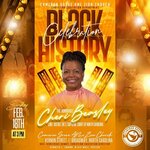
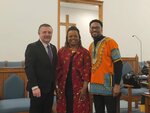
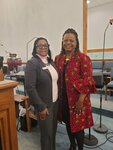
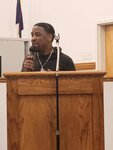
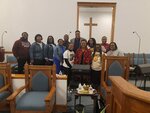
On Sunday, February 18th, at 3 pm in Broadway, North Carolina, the Cameron Grove African Methodist Episcopal Zion Church held a Black History program focused on the theme, Celebrating Our History, Heritage, & Humanity. The program was uplifting, inspiring, and permeated with Black Culture and Excellence. The celebration opened with a Call to Worship by Rev. Kenneth Lamont Swann, Pastor of Cameron Grove, followed by a Worship Leader and Congregational Litany by Ms. Effie B. Woodard, who serves as Director of the Dunn-Lillington District Christian Education Department. The atmosphere - already charged with purpose and power – was only further stirred as the congregation stood to sing a rousing rendition of the Celebration Hymn in the form of the Black National Anthem written in 1900 by James Weldon Johnson, “Lift Every Voice and Sing.” For all three verses, the congregation energetically and earnestly lifted up the words that are, in the words of the NAACP, “…set against the religious invocation of God and the promises of freedom.”
The program moved intentionally and diligently through the reading of the Scripture (2nd Corinthians, 3: 17) and prayer. The Occasion and Welcome, given by Mrs. Minnie B. Ragland, Varick Christian Endeavor Society Director, was a reminder of the importance of Black History Month, an affirmation that Black people matter, and a reminder that it won’t always be night. As she was talking, Mrs. Ragland quoted American author and abolitionist by the name of Harriet Beecher Stowe, “When you get into a tight place, and everything goes against you till it seems as though you could not hang on a minute longer, never give up then, for that is just the place and time that the tide will turn.”
Following a musical selection of “I Love to Call Him” by the choir for the afternoon named “Sadie’s Grands,” members of the community rose one at a time for the Clarion Call. According to Oxford Languages, a clarion call is typically known as “A strongly expressed demand or request for action.” Mr. Walter Ferguson, Council Member at Large for the City of Sanford, NC, described the significance of Black History Month and the reality that American history does not exist without Black history. Ferguson communicated that he learned in school about the names of mainstream Black history. Still, it was the church that gave him a broader and deeper perspective of those involved in the movement and the meaning of Black History. Councilman Ferguson called for continued preservation of “the history of the Black church, the Black church itself, and Black history” by expressing the importance of exercising the right to vote. President of the Harnett County Chapter of the NAACP, Mr. Tony Spears, and Ms. Denise Thurman from the Harnett County African American Heritage Center also offered words of wisdom. Following the act of stewardship, introduction of the speaker, and a soul-stirring rendition of CeCe Winans’ “The Goodness of God,” the keynote address was given by former NC Supreme Court Chief Justice, The Honorable Cherie Beasley.
Beasley highlighted the Black History Month 2024 theme, “African Americans and the Arts.” She began by talking about the importance of Black art to history and our current context today. She stated, “We know that for our communities and people around us, the arts have really offered an opportunity for freedom of expression, even in the most difficult of circumstances.” Beasley underscored the arts and faith as common core tenets that anchor the Black community. She expressed that language of the arts - through music, especially, “…gives us the same foundation of richness, of hope, of Jesus, of love, of aspiration, and of fulfillment of seeing our children, and our children’s children go forward and do great things.” Beasley verbalized the significance of artists who paved the way for those who came after them and emphasized the work of legends such as John Coltrane and Nina Simone.
Former NC Supreme Court Chief Justice Beasley described the arts as being born out of “an emergent people,” out of “a need to fight for justice, and to allow people of color to have a voice.” She eloquently framed the lived experience of many and the perceived experience of others: the arts within the African American culture go hand-in-hand with the church. Themes of faith and storytelling were interwoven throughout her message as critical elements of the fight for justice and equity. As she closed, Beasley challenged the hearers and each of us to recognize that “voting is a value set…we must spend our values and vote our values,” serve those around us, “embrace justice and empowerment,” and use our voices to make a difference. As we uplift Black History throughout the year, may we continue to celebrate our history, heritage, and humanity.
Comments
No comments on this item Please log in to comment by clicking here